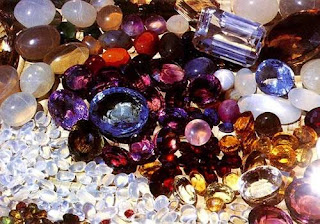 |
| Converting poker chips into coin tokens. |
My D&D setting uses a global economic system of trade known as the precious exchange. This system is 100% an excuse to just use the default system of exchange from the PHB almost everywhere.
Everyone uses this currency system because everyone does trade with the dwarves, and all dwarves use this system exclusively, forcing surface people to deal as they do. While nations will stamp their coins as they see fit to control counterfeiting, the dwarves don't really give a damn, as long as the coins are of pure material and the correct weight. While most nations use coins, the dwarves only care about weight, measuring lumps of metal in standard portions called "pieces".
The base currency is copper pieces, and everything else is valued as a multiple of coppers. Higher value currency types symbolically represent a quantity of coppers, and by relation, a quantity of one-another.
A copper piece is about as valuable as an american dollar was in the 1950s. You can buy a loaf of bread or stein of beer with a single copper piece. Peasants and servants are paid in coppers.
Silver pieces represent 10 copper pieces. A silver coin represents unskilled labor wages for a day, and basic services such as temporary lodging are priced in silver.
Electrum pieces represent 50 coppers. Electrums are high-value coins, and represent the value of slow-trading goods like clothing, or exotic imports like javelins. Generally, the lower and middle classes aim to save up some quantity of electrum for periodic necessary purchases, like roof thatching.
Gold pieces represent 100 copper pieces or 10 silver pieces. Skilled labor and fine goods are priced in gold pieces. It is the common currency of exchange among the merchantry, as they deal in distance expenses and purchase goods in bulk. Professional labor, such as spell casting or mercenary services, are paid in gold, and the upper-classes all deal in gold as expenses.
Platinum pieces represent 1,000 coppers, 100 silvers, or 10 golds. This is the currency of international exchange and major services. Weapons and armors are priced in platinum, specialist gear with fine craftsmanship are priced in platinum, armies are hired out in platinum, specialist services like enchanting are paid in platinum. This is the currency of the upper nobility, and is rarely seen in circulation among the lower and middle classes.
In addition to metals however, the dwarves also deal in gemstones of standard weights. While most nations make use of this for international trade with dwarves, this form of exchange is not as common amongst the surface folk, and is almost never seen among the common kind.
Gemstones are a higher form of currency, and are used in the precious exchange. Gemstones have a weight of 100:1lb., and so are an effective way to carry more value in less weight. Different types of gemstones are worth varying quantities of platinum pieces.
 |
| Gemstone prop selection. |
1PP
Azurite
Banded Agate
Blue Quartz
Eye Agate
Hematite
Lapis Lazuli
Malachite
Moss Agate
Obsidian
Rhodochrosite
Tiger Eye
Turquoise
5PP
Bloodstone
Carnelian
Chalcedony
Chrysoprase
Citrine
Jasper
Moonstone
Onyx
Quartz
Sardonyx
Star Rose Quartz
Zircon
10PP
Amber
Amethyst
Chrysoberyl
Coral
Garnet
Jade
Jet
Pearl
Spinel
Tourmaline
50PP
Alexandrite
Aquamarine
Black Pearl
Blue Spinel
Peridot
Topaz
100PP
Black Opal
Blue Sapphire
Emerald
Fire Opal
Opal
Star Ruby
Star Sapphire
Yellow Sapphire
500PP
Black Sapphire
Diamond
Jacinth
Ruby
In most cities and other major trade hubs, (where the regent allows such things) the dwarves operate independent banks, which conduct currency exchange. Exchanging between currencies costs an additional fee per piece. The exchange fee is almost always 1 piece of the currency of the preceding value. So, exchanging 10 copper to 1 silve is 11 coppers, and exchanging 1 gold into 100 coppers is 1 gold and 1 silver.
In nations where moneylending is legal, dwarven bankers will often provide this service, though the details are highly variable due to the highly variable laws regarding moneylending from one land to another. Be cautious when borrowing money, even from the dwarves. If the law allows them to pass your debt to your surviving family, or to seek payment in indentured service or blood, this could be an extremely dangerous contract to engage in. The dwarves are not above such things when it comes to coin.
Dwarven banks, where allowed, may also provide insurance services, where they will cover limited losses of property in return for regular income. Oftentimes major loans will come with the stipulation that insurance be taken on the object purchased until the loan has been resolved.







No comments:
Post a Comment